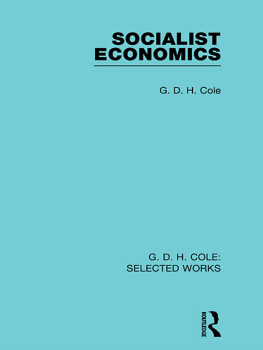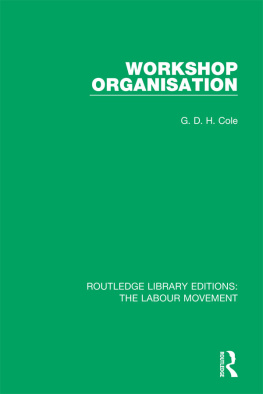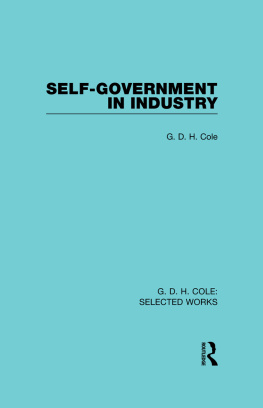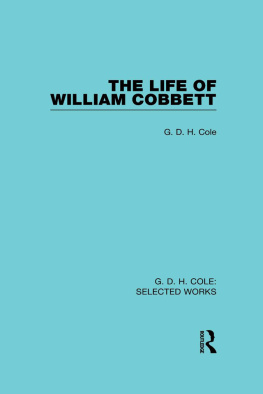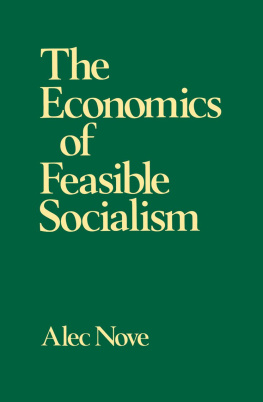G.D.H.COLE: SELECTED WORKS
SOCIALIST ECONOMICS
SOCIALIST ECONOMICS
G.D.H.COLE
Volume 10

LONDON AND NEW YORK
First published in 1950
This edition first published in 2011
by Routledge
2 Park Square, Milton Park, Abingdon, Oxon, OX14 4RN
Simultaneously published in the USA and Canada
by Routledge
270 Madison Avenue, New York, NY 10016
Routledge is an imprint of the Taylor & Francis Group, an informa business
This edition published in the Taylor & Francis e-Library, 2011.
To purchase your own copy of this or any of Taylor & Francis or Routledges collection of thousands of eBooks please go to www.eBookstore.tandf.co.uk.
1950 H A Cole
All rights reserved. No part of this book may be reprinted or reproduced or utilised in any form or by any electronic, mechanical, or other means, now known or hereafter invented, including photocopying and recording, or in any information storage or retrieval system, without permission in writing from the publishers.
British Library Cataloguing in Publication Data
A catalogue record for this book is available from the British Library
ISBN 0-203-83952-8 Master e-book ISBN
ISBN 13: 978-0-415-56651-3 (Set)
eISBN 13: 978-0-203-83931-7 (Set)
ISBN 13: 978-0-415-59842-2 (Volume 10)
eISBN 13: 978-0-203-83952-2 (Volume 10)
Publishers Note
The publisher has gone to great lengths to ensure the quality of this reprint but points out that some imperfections in the original copies may be apparent.
Disclaimer
The publisher has made every effort to trace copyright holders and would welcome correspondence from those they have been unable to trace.
SOCIALIST ECONOMICS
by
G.D.H.Cole
Copyright 1950 by G.D.H.Cole
PREFACE
THIS short book has been written at the request of the Fabian Society, whose members were felt to need something of the sort as a starting point for the fuller restatement of economic doctrines in accordance with socialist principles of production and distribution. The need was considered to be the greater because of a growing tendency to confuse state economic planning with Socialism, and thus to produce a diluted socialistic doctrine which is little more than Keynesian Liberalism with frills, or again to think of Socialism as concerned almost solely with the distribution of the national income and not with the conditions under which it is produced. I am conscious of having done no more than lay down certain broad socialist principles which call for much fuller elaboration than I have been able to give them in so brief a study; but I hope my view of the principles will commend itself to my fellow-Socialists, and will induce some socialist economists to work them out much more thoroughly.
The main criticism that I expect to meet, among Socialists as well as from opponents, is that the conception of economics here put forward involves taking into account many factors which either cannot be exactly measured at all, or, to the extent to which they are measurable, cannot be measured in a common scale with other factors, such as are ordinarily taken as the subject-matter of economic calculation. My answer is that, desirable as it is to measure as exactly as possible whatever can be reduced to terms of calculable units, and satisfactory as it may be to weigh as many factors as possible one with another in a common scale, there are nevertheless many factors which are not the less important because they cannot without falsification be treated in this way. The subject-matter of socialist Economics is the good life as affected by the entire process of production and consumption of goods and services which are either naturally scarce or created only by the expenditure of human effort and ingenuity. Its pluses are the goods and services made available for consumption and the satisfactions derived from the work of producing them: Its minuses are the damages inflicted on natural beauty and amenity in the course of production, the using up of irreplaceable natural resources or of resources which cost effort to replace, and the dissatisfactions arising out of dull or irksome labour, or an excess of labour beyond what makes for greater happiness than idlenesswhich is the economic name for excess of leisure.
It is nonsense to contend that men cannot weigh such disparate things one against another; for men continually do just this, both in the private judgments by which they decide between alternative courses of action and in the public judgments which give preference to one social measure over another or distribute a limited public expenditure among competing uses. In very many cases such judgments, public or private, cannot possibly be compared in their results, or in estimates of their likely results, on any quantitative basis. But this does not make it the less necessary to choose between them, or to choose so much of one good thing and so much of another, when there is a limit to the total that can be afforded. Nor is it the less necessary to decide how much bad we are prepared to put up with in order to get so much good or how much good to sacrifice in order to avoid so much badeven when we cannot measure the one against the other in exact quantities. We are continually doing these arithmetically impossible sums, both for ourselves and as citizens in favouring or opposing particular social policies; and it is the business of socialist Economics, which discards the laissez-faire assumption that only effective demand is to be counted in settling what is economically worth while, to take due account of all the factors, in accordance with value judgments based on the socialist principle that in the last resort all men have equal rights to the means to happiness, as far as these depend on the use of human effort in production and on the distribution of the products of such effort.
This short book is an attempt to work out in general terms the implications of this utilitarian conception of economic affairs. It can hope to achieve no such elegance of presentation as is open to those who, setting aside value judgments, are content to move solely in an abstract world of purely market values, and to discard everything that cannot be adequately measured on a common price scale. Morals, of which socialist Economics is quintessentially a branch, never has lent itself to tidy quantitative assessment of what a man ought to do, in order to do right; and morals never will. But I, for one, would much sooner be an untidy social moralist than leave out half the relevant factors in order to achieve a speciously scientific conclusion. Socialism rests essentially on moral principles; and socialist Economics is the study which concerns itself with the carrying of these principles into such affairs of everyday life as involve the use or misuse both of the material resources of production and of the human beings through whose efforts these resources are applied to the creation, by painful or pleasant means, of things which people would rather have than do without.
G.D.H.C.
Hendon, April, 1949.
CHAPTER I
WHAT ARE SOCIALIST ECONOMICS?
SOCIALIST Economics are not a peculiar kind of Economics devised to bolster up the socialist case: they are simply a commonsense re-statement of economic laws and principles in terms appropriate to the world of to-day and to-morrow. On a great many matters of fundamental economic doctrine there is no difference between Socialists and other people; for where men of different opinions are studying the same facts in a spirit of honest enquiry there is plenty of room for agreement about them, however wide the differences about the policies that should be adopted in dealing with them may be. Thus, no one in his senses doubts that if the price of an article is increased without an equal rise in the prices of other articles, in most cases the demand for it will tend to fall off especially if other things can be substituted for it. Again, no one in his senses denies that all production involves some using up of scarce resources, so that what is used in making one thing is not available for making others. This means that human wants can be satisfied only within limits set by the supply of scarce resources that can be employed in meeting them; that getting some things accordingly involves forgoing others; and that the purpose of good economic organisation is to ensure that the wants which deserve to be given preference shall be met before those which are less deserving.


